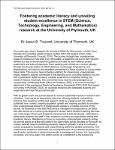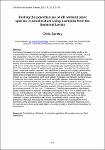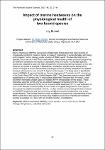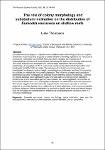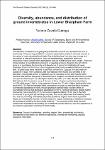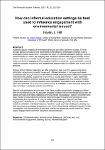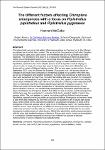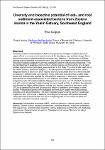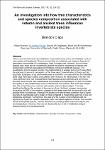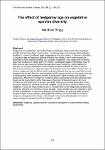The Plymouth Student Scientist
Please either use the search box above or select the papers for the required year and volume via the 'Sub-communities within this community' below
Description:
Opportunities to publish (submission guidlines):
This opportunity only applies to students from STEM subjects who are studying at the University of Plymouth (ONLY). Main criteria:
- You have received a 1st in your final year undergraduate project (in a STEM subject).
- There is no guarantee of acceptance. However, all will be seriously considered for publication. You are welcome to express an interest, although we would also suggest discussing your intentions with your project or dissertation supervisor.
- When all parties are willing, we finally require signed electronic consent. Please note, this link requires a University of Plymouth login to access. Also, the consent form contains downloadable content to help with your conversion. Please use this consent form
Journal Editorial Board
Publisher
Copyright and License
Sub-communities within this community
Collections in this community
Recent Submissions
-
Fostering academic literacy and unveiling student excellence in STEM (Science, Technology, Engineering, and Mathematics) research at the University of Plymouth, UK
(University of Plymouth, 2023)Six years ago, when I stepped into the role of Editor for this journal, I couldn't have foreseen the incredible wealth of talent nestled within the student cohort at the University of Plymouth (Truscott, 2018). The journey ... -
Testing the potential use of UK wetland plant species in paludiculture using examples from the Somerset Levels
(University of Plymouth, 2023)The trade-off between economic benefits and environmental sustainability results in the unsustainable use of wetlands through conversion to agricultural land. As a result, causing peat degradation, reducing the ecosystem’s ... -
Impact of marine heatwaves on the physiological health of two fucoid species
(University of Plymouth, 2023)Marine Heatwaves (MHWs) are periods of high-water temperature that have become an increasingly significant threat to marine ecosystem biodiversity in recent decades with rising anthropogenic carbon driving greater severity ... -
The role of colony morphology and substratum inclination on the distribution of Eunicella verrucosa on shallow reefs
(University of Plymouth, 2023)Eunicella verrucosa plays an important role in shallow reefs, where they produce a complex 'sheet tree' morphology that supports a variety of benthic-dwelling organisms. E. verrucosa is considered 'vulnerable' by the IUCN ... -
Diversity, abundance, and distribution of ground invertebrates in Lower Sharpham Farm
(University of Plymouth, 2023)Invertebrates constitute the largest group of animals on Earth and represent the bulk of biodiversity. They are responsible for numerous essential ecosystems services and are at the centre of many terrestrial food webs. ... -
How can informal education settings be best used to influence engagement with environmental issues?
(University of Plymouth, 2023)Increasing global impacts of environmental issues will affect children’s futures. Formal primary school curriculums are insufficient in providing the information children need to understand these issues which increases ... -
The different factors affecting Chiroptera emergences with a focus on Pipistrellus pipistrellus and Pipistrellus pygmaeus
(University of Plymouth, 2023)Chiroptera (bats) are important within different ecosystems and biomes due to the different ecosystem services that they provide. The services that they provide to the United Kingdom include organic agricultural pest ... -
Diversity and bioactive potential of leaf-, and root sediment-associated bacteria from Zostera marina in the Yealm Estuary, Southwest England
(University of Plymouth, 2023)Increasing antimicrobial resistance (AMR) among human pathogenic bacteria demands urgent efforts to uncover novel natural products for developing new antibiotic drugs. Since terrestrial sources of natural products are ... -
An investigation into how tree characteristics and species composition associated with veteran and ancient trees influences invertebrate species
(University of Plymouth, 2023)Veteran and ancient trees have distinctive characteristics that act as microhabitats: such as tree cavities and deadwood. These trees and their microhabitats are keystone features for specialised communities of invertebrates, ... -
The effect of hedgerow age on vegetative species diversity
(University of Plymouth, 2023)Hedgerows are a distinctive part of the English countryside and provide many ecological benefits and services. Over recent history, hedgerows have been removed and replanted, resulting in a matrix of different aged hedgerows ...



